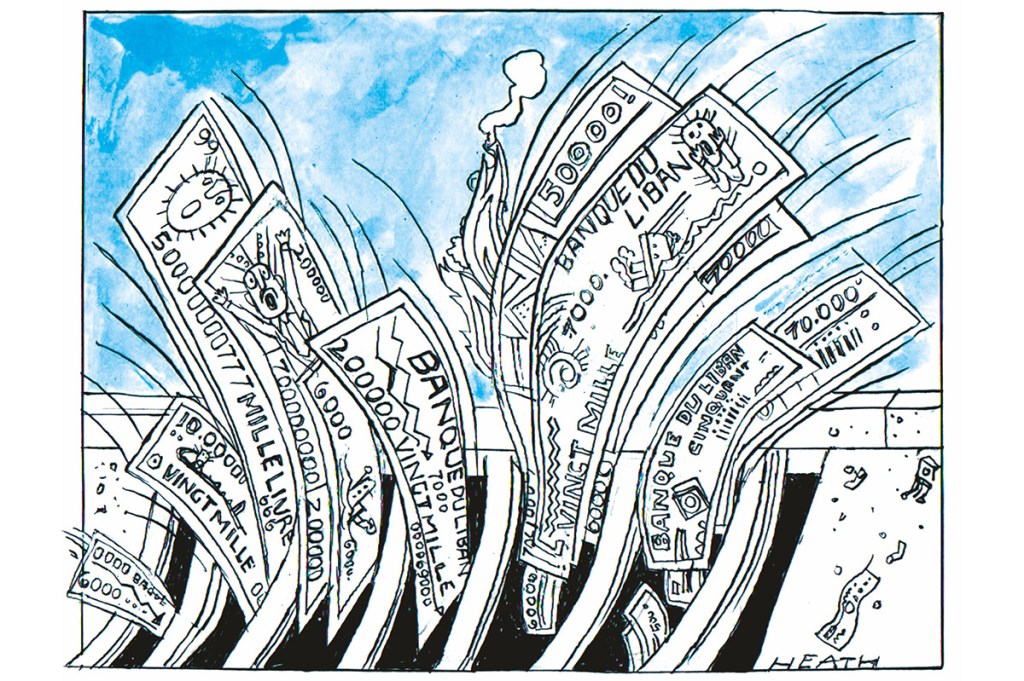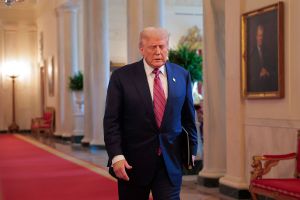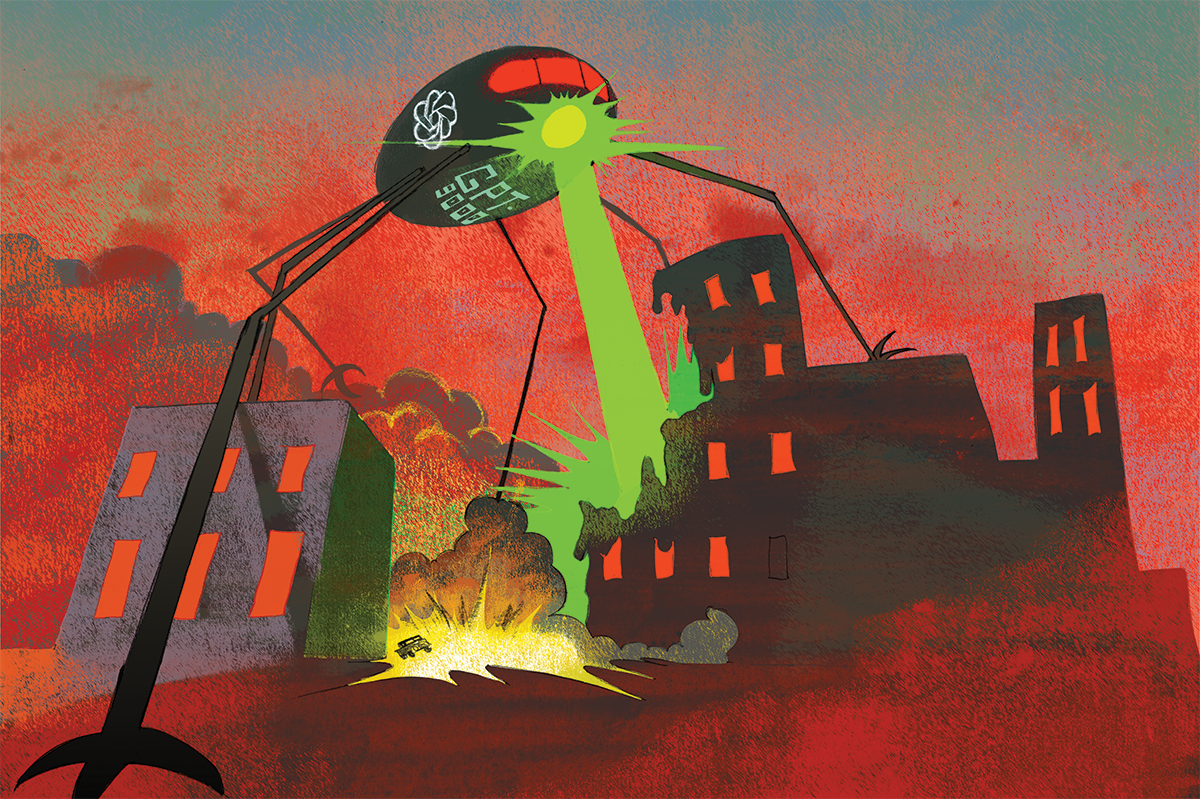I’m a millionaire. A million in crisp, new bills is stacked up on the table in front of me. Unfortunately, it’s Lebanese lira and cost me about $75 a week ago. It’s already worth only $65, and by the time you read this, it will be worth even less.
The Lebanese currency has lost more than 90 percent of its value over the past 18 months and is continuing its steady decline. It would be foolish to keep more than a few days’ spending money on hand, so everyone has a moneychanger. Mine is Mohammed, who pops round on his moped with ever-fatter stacks of notes with ever more zeros on them. The currency grows physically as it shrinks in value. He passes over a wad of cash and says, smiling: ‘Our leaders are stupid and corrupt.’
That’s true, but only part of the story of what has gone wrong. Mohammed is here because no one uses the banks to change money anymore. That would be crazy when the official exchange rate is still 1,500 lira to the dollar, one-tenth of the black-market rate of just over 15,000 to the dollar (at the time of writing). Mohammed used to be a chef, a job where he made things that people wanted, adding a small but tangible amount to the nation’s wealth. Now he’s one of thousands of people employed in the completely useless but absolutely indispensable business of ferrying stacks of printed paper back and forth by moped, to make up for the catastrophic failure of the banking system. It’s one small example of the inefficiencies that creep into an economy when you can’t trust the money anymore.
Everyone is poorer as a result. Mainly, people are poorer because wages can’t keep up with runaway prices. The head bookkeeper at a large hospital told me he was now making the equivalent of $120 a month. The doctors were on about $200, he said, and half of them had left to work abroad. People can’t live on those salaries, not least because Lebanon imports more than half of its food.
;768:[300×250,336×280,320×100];0:[300×250,320×100,320×50]”]Parked outside a nearby church is a line of Audis, Mercedes, BMWs and Range Rovers. This isn’t a smart wedding or a christening, as you might expect in normal times. Instead, the church is giving out food aid: small, mean-looking boxes of rice and pasta and the cheapest kind of sunflower oil. The people trudging away with these boxes, eyes fixed on the ground, are from Lebanon’s traditionally comfortable middle classes. Others are far worse off.
A sense of unreality surrounds every transaction as, by law, the dollar amount at the official rate is printed on every lira receipt. I hand over a couple of 100,000 lira notes for a pizza at lunchtime. That’s $12 or $13 but the receipt informs me that if I pay in dollars, the bill comes to $130. Perhaps a (very) rare tourist has been caught out by this, buying the world’s most expensive pizza. The government continues to insist that for imports of some vital goods — food, fuel and medicines — the lira is worth the fictional rate of 1,500 to the dollar. What this means is vast government subsidies to import these goods.
This has had some perverse effects. For a long time, you could fill up your car for about five bucks. The gas station would charge you, say, 60,000 lira, which was $40 at the official exchange rate, except your lira would have come from the black market at a fraction of that. As any economist will tell you, if you don’t ration by price, you ration by queuing, as in the Soviet Union. So there have been long lines at gas stations and now actual rationing, a quarter of a tank per customer — and that’s if you can find a gas station open at all. A side effect of the fuel shortage is that the internet is slowing to a crawl, sometimes breaking down altogether. The commonly accepted explanation is that there’s not enough diesel to run the power plant belonging to the national phone and internet company.
It’s the same with medicines. We’ve just bought a year’s course of treatment for our daughter’s nanny, who has breast cancer. We went to the hospital with 225 million lira in cash. It filled a small backpack. Those lira cost some $15,000 on the black market but they paid for $150,000 worth of medicines at the official exchange rate.
Lebanon is temporarily the cheapest place in the world to have cancer. People are coming here for treatment; subsidized medicines of all kinds are being smuggled abroad. A hypertension drug named Atacand has turned up for sale in Kinshasa, at $20 a box. It was bought in Lebanon for $2 a box. Atacand is therefore unobtainable here now. One report about this absurd situation quoted a Lebanese expat in Kinshasa who was buying the drug there to send back to his village at home.
;768:[300×250,336×280,320×100];0:[300×250,320×100,320×50]”]As people used to say in Britain in the 1970s, this is the economics of the madhouse. This can’t continue and it won’t — it’s like watching a country slowly cut its own throat. Lebanon’s foreign currency reserves are almost drained. Soon there will be no more dollars to subsidize imports. Prices will have to reflect the real, increasingly debauched value of the currency.
The slide in the lira began in 2019, even before the crippling economic blows of the pandemic and the explosion at the port of Beirut that wrecked the city center. The lira had been overvalued for years, pegged to the dollar through aggressive intervention by the central bank. This policy was universally popular in Lebanon. It gave everyone the idea that they were richer than they really were. Things from abroad seemed dirt cheap: new cars and Filipino maids for the professional classes; flatscreen TVs and the latest sneakers for the workers.
On the other hand, the overvalued currency made exporting difficult. Lebanese goods were priced out of foreign markets. It was difficult to attract new investment from outside. So Lebanon continued to make very little to sell abroad: olive oil, some very nice nuts and — ironically, given the current mess — banking services. A banker friend of mine used to shake his head at the folly of his country’s economic policy: ‘I tell other Lebanese, you don’t have any more education or any more skills than the Egyptian or the Iraqi pumping your gas. What makes you think you’re better than them?’ The Lebanese were not — another phrase from Seventies Britain — paying their way in the world. The whole country was living beyond its means. This was not prosperity but the illusion of it.
The illusion held everyone in its spell for a time because Lebanese abroad kept sending dollars home. Thanks to the civil war of the Eighties and Nineties, there are more Lebanese outside the country than inside. They deposited dollars with Lebanese banks, which exchanged them for lira and paid high interest rates. The dollars were passed to the central bank, which used them to prop up the lira. Everyone was delighted. The bankers paid themselves bonuses in the millions, or tens of millions, of dollars. It seemed as if the good times would last forever. Then this supply of dollars began to fall. The banks got desperate, calling up rich Lebanese abroad and offering them 25 percent interest rates. This was a Ponzi scheme and — inevitably — it collapsed. Angry depositors besieged the banks but it was too late: their money was gone.
It didn’t help that the central bank was printing money to pay for ever more bloated state budgets. Lebanese politicians depend on patronage for their power, giving jobs to supporters or even just to family members. In one notorious government department, every official seems to be related to every other official: an administration of cousins. Some posts are ghost jobs, existing only on paper and when it comes time to pay salary. People understand: this is how things are done. Most Lebanese just shrugged at news that the central bank governor, Riad Salameh, had been accused by the Swiss authorities of stashing $300 million in a hidden bank account in Zurich. He denies embezzling the money but the whole political class is seen as extraordinarily, personally corrupt.
It now falls to this same political class to take the painful decisions the country needs. A former senior Christian politician told me he thought the situation was hopeless. He drove around his neighborhood at night, he said, and all the lights were out: everyone had left. He thought that Christians were now less than 15 percent of the population of Lebanon (which was created by the French to have a Christian majority at independence). If so, that is one symptom of how the economic crisis is hollowing out the country. His solution was to carve separate statelets out of Lebanon. Sunnis, Shia and Christians could all go their own way, he said.
;768:[300×250,336×280,320×100];0:[300×250,320×100,320×50]”]That would quickly reignite the civil war. Lebanon is always cursed with that possibility, however near or far. Meanwhile, the country is having to relearn the lesson that the first and perhaps most important duty of the state is to provide sound money. This isn’t, yet, Weimar Lebanon, with people going shopping with wheelbarrows full of money or lighting fires with bundles of notes. But little knots of child beggars are starting to appear at traffic lights in Beirut. The Lebanese are living through a terrible economic experiment, a warning to everyone else: destroy your currency and you destroy your country.
This article was originally published in The Spectator’s July 2021 World edition.

























